KUALA LUMPUR, August 7 — Datuk Seri Najib Razak today sought to dispel negative connotations associated with his “cash is king” philosophy, criticising his predecessor Tun Dr Mahathir Mohamad for misinterpreting the line often associated with him.
Speaking at a special forum called “Hard Truth: Cash is King”, here at the Umno headquarters, the former prime minister said that he did not mean the line by its literal meaning, but rather one with a deeper context and with the public’s well-being in mind.
“I did not mean it in a literal way when I said cash is king.
“Actually what I meant was the people are the king and the cash, we use to help the people. Tun Mahathir perceived a connotation that is inaccurate. Maybe he didn't understand or deliberately doesn't want to understand, or pretended to not understand.
“What I meant was as a government, our responsibility is to help those who need help.
“The poor, those who have kids and have no money to buy clothes, shoes, as the Western saying goes, cannot put enough food on the table, those with family members who are old,” he said.
Najib was responding to a question by the forum moderator, on what he truly meant with the line, which Dr Mahathir often uses in his criticism of Najib and his administration’s policies.
He said his past government had worked to increase revenue to help those in need, especially those in the lowest group of wage earners categorised as B40 by introducing the Goods and Services Tax (GST).
He also denied allegations that his administration practised favouritism when it disbursed aid to the public, adding that Barisan Nasional (BN) helped everyone in need, regardless of their political leaning.
The former finance minister added that the 1Malaysia People's Aid or BR1M, was among BN's popular initiatives, claiming that it is something which the public misses.
“They actually eagerly awaited the distribution of BR1M, one of the things they lament as the biggest loss. Something for which they feel they miss the BN era,” he said, reiterating his previous economic argument that the annual cash handout had greatly stimulated the local economy.
Expounding his point further, Najib said that in his Pekan parliamentary constituency, BN distributed RM26 million in BR1M handouts yearly, which led to brisk business for night market traders, grocery stores and supermarkets.
Najib also denied that his government policies were pro-Malay, and that it disregarded the wellbeing of other races.
“If we look at in a glance, maybe if we see it statistically, of course those who get most of the BR1M handouts are Malays, the Bumiputera Malays.
“However, from a percentage view, Indians are the most. This is because though their number is not huge, but the percentage of those who qualified for BR1M, is bigger than the Malays.
“If the Chinese feel that they don't get [BR1M] or that very few get benefits, look at the purchasing power. Who has the purchasing power? Now the ethnic Chinese-owned supermarkets are closed, there are those sellers who feel that their business has dropped.
“When the purchasing power lowers, and the purchasing power is with the Malays. So when in the first round, the Malays get it, they then buy things from which the Chinese profit from. So everyone benefited from our policies,” he added.
Some Pakatan Harapan (PH) leaders, including current Prime Minister Tun Dr Mahathir Mohamad, had previously labeled the BR1M programme as a form of “corruption”.
Despite the accusations, the cash handout assistance was highly popular. PH eventually decided to retain the programme but rebranded it as Bantuan Sara Hidup or BSH.
In April last year just before GE14, the then-BN administration approved a total of RM6.12 billion worth of cash aid under the federal government’s annual BR1M scheme, for seven million Malaysian households.
The Finance Ministry said that 7,084,726 applications for this year’s cash handout had been approved as of March 31.
These seven million-odd households are divided into three categories, including RM1,200 cash aid to 3,705,853, or over 3.7 million households with a monthly income of RM3,000 and below.
This group takes up the biggest chunk with a total of over RM4.4 billion.
Those approved to receive a total of RM900 cash aid each are 324,973 households earning between RM3,001 to RM4,000 per month, while RM450 in aid will be given to 3,053,900, or just over three million individuals earning less than RM2,000 each month.
The group receiving the RM900 cash aid takes up around RM292.48 million of the RM6.12 billion allocation, while the category eligible for the RM450 aid accounts for the remaining RM1.37 billion.



















